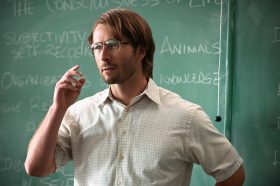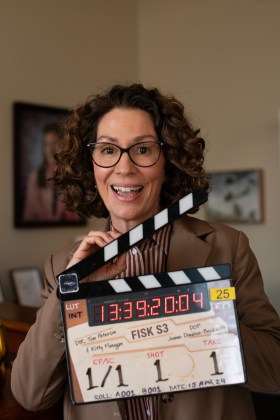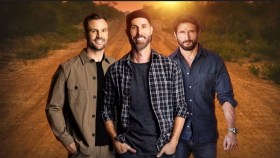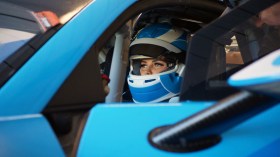Start small, learn from an expert, grow big and prosper. Image: Capybara and pups.
Screen professional women’s collective Dame Changer is running an intensive three day learning and development experience which is designed to share ways to accelerate screen projects to market.
Applications have been extended to March 31; the workshop will happen in Sydney from 1-3 May; the price for the entire team over the four days is $900.
It is project based and will look at twelve teams, which are expected to have a director and producer. While the requirements preference women, there are ways to include men. Emerging creators are encouraged to apply, though, ‘Ideally, at least one woman in your team must have over ten years industry experience and have successfully delivered a long format project to market in the last five years,’ according to the website.
It covers feature films and documentaries and is based on three themes – audience and marketing, sales and distribution and sales, release and marketing strategy.
According to facilitator Beatrice Neumann, ‘Screen Tank is a programme to which teams can bring their projects, test and develop them in a safe environment and benefit from the input of an excellent line-up of speakers and trainers.
‘Through presentations, workshops, case studies and individual and peer feedback, the project teams will gain a better understanding of what their project is, where it sits in the world and how to present it in the best possible way.
‘The teams will most certainly walk away with quite a to-do list, however hopefully also with a better idea of next steps and a better idea about the way to market and ultimately to their audiences.’
This could be a very powerful program. Beatrice Neumann is a film and distribution consultant based in London who came from acquisitions, and mostly works directly with filmmakers as a story and script consultant. She is able to develop marketing and distribution strategies as part of this early development. She has been involved in Last Ride, Balibo and 100 Bloody Acres, all from Australia with very different styles.
Also on the team is Meg LeFauve who has a story credit on Captain Marvel and a screenplay credit on Inside Out, key key Sydney producer Kristina Ceyton, content strategist Beatrix Holland and distributor Jonathan Page.
Beatrice Neumann answered some questions by email from London in which I tried to capture the essence of her combination of script and sales skills.
Why is time so important in the development process?
‘Our biggest challenge today is to make time for anything really. Creative processes need to flourish, initial ideas come often quick and fast, however transforming them into a great script is often a slow process with notable exceptions and even involves occasionally walking away from it for a while.
‘Those who take the time to hone in on the best possible version of the script are much more likely to have a pay-off. My biggest disappointment are great ideas which were not developed to the end and it shows on the screen every time.
‘There is so much content out there with which each project competes and one thing as filmmakers you have control off, is to realise the best version of your own idea. Being able to give a project the time it needs is a challenge if you need to support yourself and with very little development money around. However it is not just about time, it is about the headspace you need to create something magical which makes it a most precious commodity.’
It seems that a good project always has something that provides inner life. What is it?
‘Great projects, which evolve into great works of art or great entertainment are rare and special, and usually are a case of the stars aligning, especially when quality not only leads to a great artistic result but also finds its audience. The recipe of success is a magic mixture, which rarely can be repeated as much as some claim to have the formula. What makes one project work will cause the next one to fail.
‘The films, TV, art, etc that inspire us often doesn’t tell a new story, but it’s told in an interesting and unique way, which captures our imagination. In a perfect world these great projects find their backers and their audience, in the real world that doesn’t happen easily.’
What are the warning signs that a film is not going to evolve in development?
‘It is hard to distinguish between a project that is stalling in development and a project which can’t be beaten into shape and thus maybe should be dropped. As I am not a producer, this is not a decision I typically make.
‘However as someone who is usually brought in from outside to bring fresh ideas and approaches to the table, it is when I’ve exhausted all possible pathways to crack areas which we’ve identified as issues. Saying that it may still be the case that I am just not the one to get the project to where it needs to be.
‘As long everyone is making the same film, you know when you’ve reached the end of the line, however sometimes it is a case to walk away for a while and if you never revisit it again, you know…
‘What I would highly recommend, stuck or not stuck in development, is to not make a project in isolation. Instead make friends with experienced filmmakers, sales companies, distributors, funders and financiers and confidentially get off-the-record feedback. This is best from people who are good with scripts but maybe are not your desired future partners as you wouldn’t want to risk putting them off at a stage where everything is still possible.
‘We need great stories as much as we need to eat.’ Beatrice Neumann
‘Many market players nowadays want early ‘in’. This is, as most things, a two-edged sword as feedback often can be contradictory. A key quality for a producer is to understand and nurture the talent (writers and directors in my world) they are working with and manage this process carefully, make sure the creative juices continue to flow and protect their talent where necessary.
How do you know a project is under developed? Or over developed?
‘Whether a project is under or over developed is not immediately apparent when I’m introduced to a project and first read the script. After meeting someone, reading the script is the first step of involvement given I am interested and want find out more. It is the subsequent conversation, which reveals one or the other.
‘When you raise the perceived problems of the script it quickly emerges whether they are aware of the flaw and whether they are on version 100 or 1. If it is version 100 then it is really hard to come up with yet another approach. If this is version one, then there is a lot more chance to find a solution given that everyone is in agreement that it is an issue which needs fixing.
‘Saying that, sometimes new collaborators can breathe new life into a great idea which got mangled in development. Fresh eyes are the closest you can find to a magic wand as long as they are the right fresh eyes.’
Is lack of money a curse, or a path to artistic excellence?
‘Lack of money is one of the reasons for lack of diversity. If you depend on holding down a full time job, it is hard to carve out that essential time, which is needed to develop a creative project or to develop any idea. Sadly I’ve seen too many promising filmmakers having to give up on a career in independent filmmaking due to existential pressures. The world is poorer for it and I would love to see this fixed.
‘Saying that I do think crisis breeds opportunity. The nerves are exposed and when you hit them you can hit them hard. Key is that as an industry we find a way to support and nurture this talent. We need great stories as much as we need to eat.’





